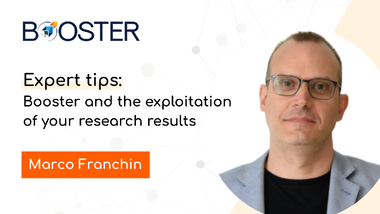How EU security projects can benefit from Booster services
18/06/2025
Booster was recently featured in the 2025 edition of the Projects to Policy Seminar, one of the European Commission’s Directorate General HOME’s flagship events, held earlier this month. Organised jointly with the Research Executive Agency (REA), the seminar served as an opportunity to align security policy and security research priorities. For EU-funded projects working in critical security-related domains, it was a valuable opportunity to learn more about the tailored and free-of-charge support services that Booster offers.
Security research projects, especially those funded by the EU, often face distinct challenges when it comes to ensuring the uptake of their results. During the seminar, it became clear that many project representatives were not only aware of these challenges but also looking to explore support options to help them bridge the gap between innovation and tangible application. It was moreover widely recognised that the impact of security-related research depends heavily on whether and how its results are adopted and applied in real-world contexts.
Booster’s Go-To-Market support service is designed precisely to meet these needs. While exploitation pathways in the security domain may vary, the goal remains the same: ensuring that valuable research outcomes translate into meaningful impact. Booster offers tailored, hands-on guidance to help beneficiaries define the next steps, mature their Key Exploitable Results (KERs), and position them for successful uptake by the right stakeholders. This relevance was clearly reflected in the discussions, with many participants showing strong interest in how Booster can help move their results forward.
During the event, Booster Coordinator, Alessia Melasecche Germini, took the floor to present the initiative to an audience composed of researchers, policymakers, and Commission representatives. She showcased the structure of Booster’s services, the application process, delivery timelines, and how the support can be tailored to projects in the security field. The Horizon Results Platform was also featured, with European Commission Directorate General RTD representative, Estelle Barillon, explaining how it complements Booster’s offering by acting as a repository for Key Exploitable Results (KERs) and providing greater visibility for project outcomes.
Looking ahead: Meet Booster at the Security Research Event (SRE) in Warsaw
The Booster team is now gearing up for the Security Research Event 2025, taking place on 24 and 25 June at EXPO XXI in Warsaw. Organised under the theme Boosting Security through EU-based Innovation, the SRE gathers key actors across the security ecosystem, from policymakers and industry leaders to first responders and research institutions.
Booster will be featured again during the conference, with Melasecche Germini presenting the services in one of the breakout sessions. In addition, Booster will have its own stand in the exhibition area, where attendees are warmly invited to drop by, meet the team, and learn more about how Booster can support their project’s path to impact.
You can find out more and register for the event here.


 (1)_small.webp)

(8)_small.webp)
_small.jpg)